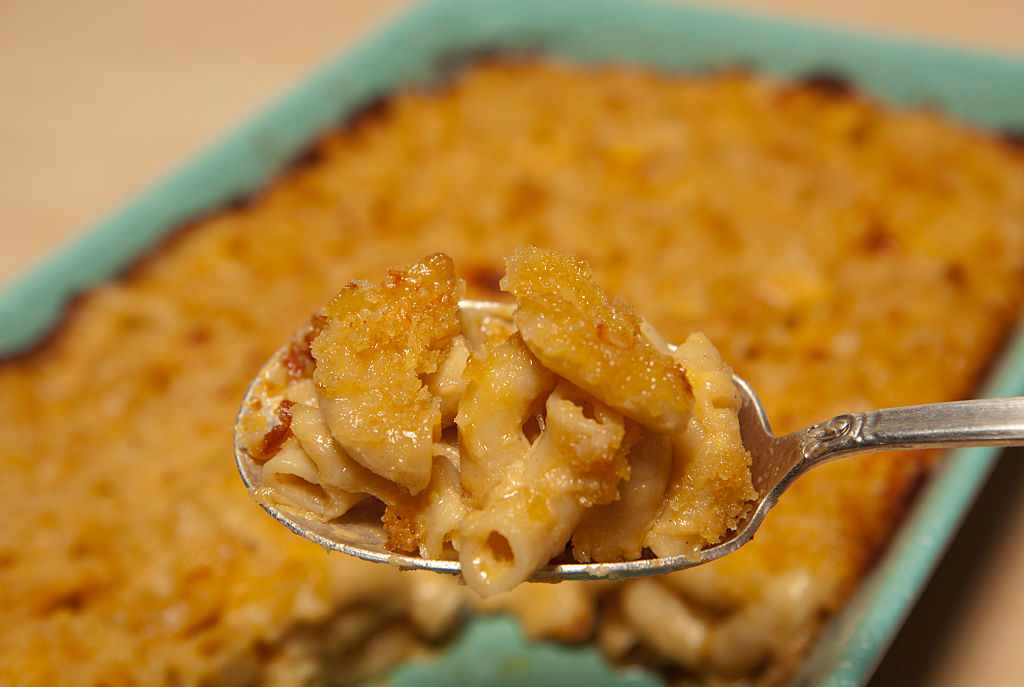Growing up, my grandma lived in a small green house that sat under a towering cottonwood tree on the south side of Minneapolis. She had many old things, or at least things that felt old to my young brain: a cast-iron fireplace that looked like it could forge steel, a massive wooden cabinet TV that hummed and seemed almost radioactive, a whole rainbow's worth of colorful mixing bowls that were sturdy enough to survive in the oven.
The bowls are what I remember the most, because I remember the kitchen more vividly than anything else. On holidays like Thanksgiving, Christmas and Easter, work would start in the narrow galley of a kitchen very early and it would go late, until family arrived, until the very minute everyone sat at the table, through the combative games of Uno to decide who would do dishes after no one was foolish enough to eat more.
On days like this I'd often help my grandma or mom with the cooking, and most often that meant chipping in on the macaroni and cheese. I'd fill a massive pot with water, dumping in an entire box worth of Creamette shells. While we waited for the pasta to bubble over, we'd grate blocks of cheese down to nubs, a treat I'd try to save as reward for the labor. Mom would combine whole milk and half a can of evaporated milk in a bowl, and then we'd begin the architecture project of carefully layering pasta and cheese on top of each other in the biggest Pyrex bowl in grandma's collection. Mom would dump the milk mixture in the bowl, top off the pasta with a mountain of cheese, and add a few slices of butter on top. That rich golden crust was not a mistake.
I learned early lessons on cooking in this kitchen. I basted turkeys and baked cookies, from the age of "using a step stool to reach the spice cabinet" all the way through "clean up the dishes after yourself." I learned the importance of following a recipe. But this was a contradiction in my grandma's kitchen: There was no exact recipe for the macaroni and cheese. This was strange to me for many reasons, the least of which is that my grandma had a rule or method for doing everything. She was an elementary school teacher and a Methodist missionary. She was a black woman whose parents had only been an arm's reach away from sharecropping and slavery. She demanded precision and fidelity in all things bright and beautiful or in between.
I inherited my grandma's recipe cards after she died—not a single trace of macaroni or cheese. My mom couldn't answer the question, because she learned it all the same way, running underfoot in the grown folks kitchen, side by side with grandma and Big Mama, the nickname my great-grandmother insisted on. It's a beautiful notion that turns on the edge of anxiety once you enter the meal planning stage of your own life, which for me began when I transitioned from family Thanksgivings to Friendsgiving in life after college. No matter how many phone calls I had with mom, the recipe remained an obscure shape just out of view rather than a precise and perfect set of facts.
It would not be an understatement to say I have made macaroni and cheese every Thanksgiving since my early 20s. But something happened along the way, taking the "recipe" with me and sitting down for dinners in Missouri and Maine, Massachusetts, and New York. Over time, it started to transform. I found a used Donna Hay cookbook that convinced me adding a little mustard to a quick cheese sauce can go a long way. At some point, I started putting Ritz cracker crumbs on the top of it all. The gift of a Martha Stewart basics cookbook in my early 30s pushed me further; I started using a roux, which then became the gateway to a bechamel, and I introduced gouda and mozzarella to the mix.
Aside from boiling pasta, there is little in my recipe today that resembles the first macaroni and cheese I learned to make myself. I know some part of me wonders if all I've done is taken the unspoken worries of upward mobility all families secretly dread and literally baked it into the food. Mac and cheese, but make it bougie as hell. Through enough years and time, that act of transformation would easily pass a test from an intellectual property lawyer. There is a simple theory at work here: What you add to any dish makes a recipe your own.
But something about that feels wrong, or opportunistic, like a hack jumping on a classic that just entered into the public domain. Because what any of our parents or grandparents lacked in recipe cards and finite measurements, they tried to instill through muscle memory and truths that live in your bones. What good are cards and scraps of paper, when you can have a living document that refuses to be forgotten or destroyed?
Like so many of the transitions in life, adulthood in particular, you learn there is no official governing body to grant honors or bestow penalties. There is certainly no Good Housekeeping Board to adjudicate family recipes, though I am sure Judge Joe Mathis could try. The reality is that you pass over the invisible transom and any notion of authorship recedes. The recipes that last are the fables that somehow managed to be passed down the family line over years, a tale of love that quite literally nourished those before you and those still to come.
No matter how much I change in this dish, in my mind—if not my actual hands—the recipe still belongs to my grandma. Whenever someone asks me to make macaroni and cheese, when I sit a piping hot ceramic bowl down on a table, pulling back tin foil to reveal a bubbling and gooey work with a golden crust, the credit always falls backward in time.






